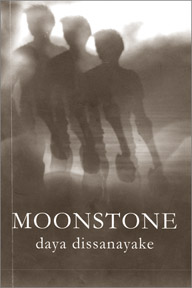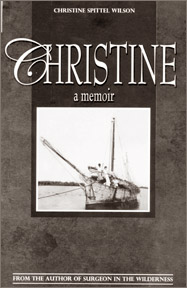An ice axe breaking the sea frozen within us
The chilling story of a man's quest to have his
father re-born as his son :
 Title: Moonstone Title: Moonstone
Author: Daya Dissanayake
Published by: Sarasavi Publishers
Reviewed by: Padma Edirisinghe
If ever a work of fiction penned by a Sri Lankan author proves
challenging enough for a reviewer Moonstone does it.
The most apt adjective for it could be that it is bewildering,
especially to naive readers used to hackneyed themes as the eternal love
triangle with the Dushtaya (wicked monster) thrown in, the Kalu Sudu
faction fighting an endless battle like our army versus the Devil's own
cadre i.e. the LTTEs, and recently the theme of love affairs between
members of the two factions.
 Moonstone explores a very novel area, that of the relationship
between Buddhist beliefs of rebirth and the spurt of scientific
knowledge grown over the centuries. Moonstone explores a very novel area, that of the relationship
between Buddhist beliefs of rebirth and the spurt of scientific
knowledge grown over the centuries.
The central character is Chandraratne, later Sandaruwan (a
mathematician and software expert who reaches the heights of a Lankan
Bill Gates), and after that just Chandare working on a coconut
plantation. The reader may conclude that he gets reborn into these three
lives. No. All these varied tri-lives, he spends in one single life.
Perhaps Sandaruwan gets fed up with his opulent and well-oiled or
streamlined life at Seychelles where he works after winning a lottery
and longs to come back to his home country and wishes to relax
incognito. One never knows, for the tale has no specific end with the
main character playing such an unpredictable role.
Earlier it was mentioned that Sandaruwan after his name change gets
elevated into one of the world's richest men and becomes the double of
Bill Gates in the software empire. But otherwise he is a character far
away from Bill Gates for the latter (as far as the reviewer is aware) is
a man leading a normal life with a, father, mother, wife, and children.
But this Bill Gates is single. He does not want to get married.
Quote "Sandaruwan did not want to be burdened with a woman for the
rest of his life. The society had no right to force every man and woman
to get married." There is indication that AIDS or not, he has had casual
love. But never is he romantic.
The hard core of the software giant is evident, especially when he
manipulates to get an ovum from a strange girl to be conjoined with his
sperm in order to produce a new life.
Feminists, take note of this new danger looming in the world of
science. The author is almost ruthless when he writes, "The ovum could
be obtained transvaginally or using a laparoscope through a small
incision in the navel".
Procreation minus any affection between the would-be parents and
performed by clever yet unscrupulous doctors! All for what? So that the
life that escapes his father's body can enter the egg fertilized by his
sperm at the correct time. He wishes to repay his father for all what he
has done, bringing him up single-handed after his mother's death.
As a multi-millionaire he had neglected his father, to wilt away his
life alone in a remote village of Sri Lanka and now overcome with
remorse he wishes to make use of the Buddhist belief of rebirth to pay
him back in his next life after re-creating him!
I only hope I have got the whole complicated wrangle correct, for at
one instance the writer states that he wishes to change the concept of
Kamma. There is also the issue of Gandabba stage, the intermediate stage
between death and re-birth, an issue on which the Mahayanists and the
Theravadins differ.
How does this Gandabba or Antharabhava concept entwine itself to the
story? For as soon as his father dies, the conception has to take place
or so it seems. Readers will have to come to their own conclusions after
reading through the maze that reflects how much creative a writer can
be.
It further transpires how skilled writers without getting bogged in
traditional, themes can explore fields as the relationship between
science and Buddhist beliefs. According to Albert Einstein Buddha was a
religious leader who came closest to scientific thinking.
But neither Sandaruwan nor the author seem to be ardent devotees of
the Buddha and there lies the irony. The software wizard is planning to
murder his father (so that the life of his son capsuled in the stolen
egg can commence at the ordained time) and so nearly become a
perpetrator of patricide, one of the five heinous crimes according to
Buddhism.
Romiel, the father is an intruder into a Sinhala Buddhist village and
some even describe Tamil origins to him. But the mother is a devout
Buddhist and her life stands out in relief against a background frothing
with wicked scheming and ruthless scientific experiments.
The mother's life as she reads her Bana texts under the Bo tree reads
like a poem. But the good die young, they say and she dies young leaving
Romiel to exert himself into bringing up the son all by himself.
He does not marry again and devotes his whole life to his son, who
having reached the highest levels of prosperity and social status,
neglects him in his busy life of building up his empire. All in all, the
book in many ways gives much food for thought. It is well nourshied with
much background information and is exciting due to its novel theme. May
be it would end up a trail blazer.
What will finally happen to Chandraratne alias Sandaruwan alias
Chandare? The gods only know. The book has no end enhancing its
mystique.
Chandare a menial worker in the environs of Chilaw, may or may not
get back to Seychelles where his software empire flourishes even in his
absence, for the instructions he had left behind work like the best of
the technological innovations of the modern world. Or may be he would
just end up going on with his saul-satisfying job.
Mental peace is far more important as his mother would have told him
in his childhood as she sat under the village Bo tree with her book of
Buddhist gaathas.
Life on the edge
Christine Spittel Wilson's inspirational autobiography
Title: Christine - a memoire
Author: Christine Spittel Wilson
Published by: Perera Hussein Publishing House
Reviewed by Anthea Senaratna
 This story meanders through the life of one of our most distinguished
writers and woman of many parts, Christine Wilson. From babyhood to the
present ninety four years is no small feat to record. This story meanders through the life of one of our most distinguished
writers and woman of many parts, Christine Wilson. From babyhood to the
present ninety four years is no small feat to record.
But Christine has done it in a manner that takes the reader gliding
through the years through breathless scenario, pausing from time to time
to explore a new happening in her life, lingering to observe the beauty
of nature, plunging into the complexities of relationships and sitting
back just to enjoy the view.
The time lapses are dealt with in the most ingenious way and her
lyrical descriptions of surroundings and scenery are exquisite to read.
Christine has reached the perfect art of cutting out all the unnecessary
trappings that can turn details into boring passages for the reader.
The opening poem 'This is my aim" and the other one dedicated 'To
Alistair" linger in one's memory. Her prose is as musical as poetry and
the reader will no doubt go back to passages to read the haunting words
therein.
The descriptions are crisp and the precise usage of words is a joy to
read - for example in the opening page "Twice a year, when the heat
sucked the rivers dry and the rasp of the cicadas was harsh in the land,
my father would disappear into unknown forests, for what reason I did
not know."
We get to know Richard Spittel not only as his public image of the
brilliant surgeon and researcher of the Veddhas in Ceylon, but also as
the adored father of Christine. His indomitable perseverance, total
unconcern in the face of danger, and his stubborn determination to
overcome his physical pain are depicted in many instances.
His great love for reading - "letting the beauty of words or great
thoughts act as an anodyne" promotes Christine's love for books. Her
mother is portrayed as a gentler person, loving, clever and always
wanting to protect Christine whereas her father wanted her to "run
free." The writer talks about her grandparents and we learn not only
about the people themselves but what life was like at that time.
Family situations and personal relationships play an important part
in the book. Christine handles these with admirable integrity. The
characters are described in great detail but here too Christine's
evocative prose is precise and to the point and does not leave room for
overtelling.
None of the "characters" is perfect, just like in real life, and this
gives the story the authenticity that makes the reader want to read on.
We may sometimes question certain decisions or actions taken by them.
But then such is life.
We all do things when viewed in retrospect we feel we should not have
done or could have done in a better or different way. Wycherly features
much in the book. First as a Nursing Home and their family house, now
turned into a school which she can see from across the road of her
present home.
We move with Christine through her schooling at Bishops College to
her transfer to England and her experiences there. There is tragedy and
sadness too. The disappearance of her "playmate" Kaira - never to be
found again; the death of a sibling which not only brings about a strain
in her parents' relationship, but also leaves Christine as an only child
who has to deal with much loneliness during her growing years.
In addition, her own personal relationships do not always run smooth
and she faces her share of disillusion and unhappiness. But ultimately
she does find happiness in her daughter and granddaughter and her
marriage to Alistair. Through descriptions of her lifestyle we are shown
an intimate glimpse of what society was like at that time.
Shifting from continent to continent Christine makes the most of life
by becoming involved in discovering new skills (writing was one of
them), and taking up new hobbies.
The range of places from Ceylon to London, Scotland, Europe in the
war years and finally Africa creates a canvass of brilliant form and
colour. The war years are depicted through experiences in Ceylon and
also the trip she does with her family through Europe.
Some of the highlights of the book are the trips to the jungle
Christine makes with her father. Wildlife and the jungles being close to
her heart, Christine's descriptions of Yala and Wilpattu are described
in detail- enough to ensnare the reader into the jungle habitat of the
leopard, elephants, myriads of birds and other creatures whose domain it
is.
A detailed account of a trip to Wilpattu by boat and a moving
description of Horton Plains in its ethereal beauty of that time,
depicts an era that can never be recaptured. Africa becomes yet another
important chapter in her life. Here too the descriptions are absolutely
breathtaking.
The Mara and other wild life sanctuaries are brought to life with the
lions, zebra and giraffe, flocks of strange birds and other wild
creatures. She also draws a picture of her lifestyle in Africa where she
embraces new friends and interests.
The story dips in an out of all these places and phases in her life
not in linear order, and the writer through her subtle use of language
transports the reader from one place to another, from one situation to
another with great ease. We move from Ceylon to London to Glasgow,
Europe and finally Africa before finally returning to Sri Lanka.
From "Christine - a Memoir" we learn about a variety of places, some
of them now lost to us forever, some still existing but much changed. We
learn about people of the past and the present who are important to the
writer. Most of all we learn about life and all its complexities and
challenges. We congratulate Christine who with the indomitable spirit of
her ancestors strove to write this memorable account of her life and
times. |
